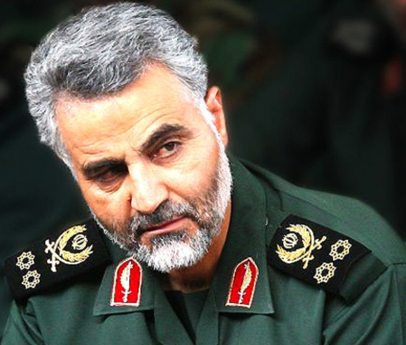
Russia figures prominently in conversations about Syria, especially when Barack Hussein Obama and John Kerry are doing the talking. The regime of Bashar al-Assad certainly owes a lot to the Russian air force; however, the “boots on the ground” in the retaking of Aleppo have been supplied by Iran and its regional proxies.
Syria is a Russian client because it is first and foremost an Iranian client. Despite the Sunni-Shi’a divide — Assad is not Sunni, but Syria mostly is — the regime in Damascus has grown to depend more and more on its Iranian patrons.
The following article discusses the role played by the Iranian commander Qassem Suleimani in the successful pushback against the Islamic State in Syria. General Suleimani has overseen Iranian successes against ISIS and other Sunni militias in both Iraq and Syria, to the point where is almost the de-facto military governor of Mesopotamia.
Many thanks to JLH for translating this article from the Frankfurter Allgemeine Zeitung:
The Man Who Helped Assad to Victory
Qassem Suleimani is Iran’s master of war and strategy in Syria. The commander of the Qods units is given to ice-cold calculation. Without him, the Syrian regime would probably not have survived.
by Rainer Hermann
December 19, 2016Supporters of the Assad regime drive through Aleppo and celebrate their victory. In Tehran, the Iranian leadership celebrates the “Triumph of Aleppo.” That is what Ayatollah Mohammed Emami Kashani called the capture of the eastern portion of the city by troops loyal to the regime — a victory of “Muslims over infidels” as he calls the Sunnis and extremists among them. The victory is the result of “determination and tenacity.” He could also have said that the capture of Aleppo was thanks to Qassem Suleimani, who since 1998 has been the commandant of the Qods units — the elite troops of the Revolutionary Guard deployed abroad. As Ayatollah Kashani was speaking in Tehran, Suleimani was doing a walk-through inspection of the citadel sector of the city his troops had just taken from the rebels. A Shi’a flag was waving over the Omajjaden Mosque attended by the Sunnis.
As important as the Russian air force was for the shift in favor of the regime beginning in September 2015, it would have collapsed without Suleimani. He established himself in Damascus in the second half of 2012 and, with the help of a commander of the Lebanese Hezbollah, reorganized the regular Syrian army. He procured weapons and equipment, and later brought Shi’ite militia and mercenaries from Iraq, Iran, Pakistan and Afghanistan. He had them trained and built a Shi’ite foreign legion of more than 50,000.
Beginning in August, 2015, he concentrated on the retaking of Aleppo, which had fallen almost completely into the hands of Sunni rebels. During that month he is said to have traveled to Moscow, despite the UN sanctions against him. In September, Russia began its military intervention to save the Syrian regime, while Suleimani coordinated the advance of Shi’ite troops on Aleppo. From June 2014 on, he was primarily in Iraq, where he was building up the militia of the “folk mobilization” (hasd shaabi). Two months after the capture of Mosul, he used them to stop the advancing IS for the first time near Ameril. There too, he was pragmatic, reaching an understanding with America, which gave air support. In Spring, 2015, he commanded the re-taking of Tikrit.
Suleimani, who was born in Kerman Province and was sent to war against Iraq in 1980 as a soldier of the Revolutionary Guard, was celebrated in his homeland like a pop star. Even to Iranians distanced from the Islamic Republic, he is a hero. Newsweek wrote that Suleimani loves war and knows he is a master of it. The Saudi press rants that he is a war criminal and terrorist. Years ago, he wrote to the commander-in-chief of American forces in Iraq, General Petraeus: “You should know that I control Iranian policy in Iraq, Lebanon, Gaza and Afghanistan.” And now also in Syria.

Love him or hate him, the man’s got one hell of a resume.
My own thinking believes that this man will prove to be very dangerous, especially to the West, and just as Iran has proven to be, a cunning negotiator.
Israel is his target and they know it.
A modern day Yamamoto, may he be shot down, or perhaps droned.
Rather controversially,I wonder if a Shi’ite strongman might be just the ticket providing that Russia and the US can agree to unequivocally stand by Israel and deter any Iranian expansion. I have also ruminated on the idea that Saudi is long overdue an international correction.
These are not assertions,merely thoughts.